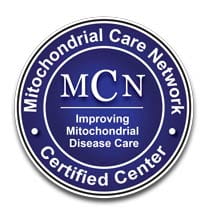Mitochondrial diseases are genetic disorders caused by errors in the mitochondria.
The mitochondria are microscopic “power plants” within cells. They create most of the energy the body needs to live and grow.
When the mitochondria are faulty and can't do their job, many organs and systems of the body start to fail.
Children with mitochondrial disease can suffer:
- Brain damage.
- Heart problems.
- Vision problems.
- Seizures.
- Other serious health problems.
Your Child's Mitochondrial Disease Consult and Care: What to Expect
If a doctor diagnosed your child with a mitochondrial disorder, we want you to know you're not alone. The Center for Rare Disease Therapy (CRDT) at UPMC Children’s Hospital of Pittsburgh is here to help.
To make an appointment for your child or refer a patient for care, contact us by:
Here’s what you can expect when you come to us for a consult.
What should I expect at my child's first visit for mitochondrial disease?
Your first visit with Uta Lichter-Konecki, MD — our mitochondrial disease expert — will take about 2 hours. If your child sees other doctors, the total time for your first visit may be 4 to 6 hours.
Your child will have a complete assessment from Dr. Lichter-Konecki.
She will make or confirm a mitochondrial disease diagnosis and find out how much the disease has progressed.
Because we work as a team at the CRDT, other experts that might see your child during your visit include:
- Eye and hearing specialists.
- A rehab specialist.
- A nutritionist.
- A genetic counselor.
- A child development specialist.
What are the next steps after my child's visit to the Center for Rare Disease Therapy?
Members of your child's care team will talk with you about likely next steps, such as:
- Further testing and follow-up visits.
- Mitochondrial disorder treatment options.
- Ways to care for your child at home to help improve their quality of life.
If surgery might help treat your child's mitochondrial disease, we'll discuss the details. We'll make sure you know what the surgery entails and how you and your child can prepare for it.
By the end of your visit, you will have a mitochondrial disorder care plan tailored to your child’s needs. We'll also schedule a follow-up visit.
Before you leave, feel free to ask us about your child's mitochondrial disorder diagnosis, treatment, or anything else.
If my child had tests, when should I expect the results?
We'll call you within 2 weeks to discuss the test results and next steps for your child's mitochondrial disease care.
Genetic testing can sometimes take several months.
You can also find your child's test results if you signed up for MyCHP — Children's patient portal.
MyCHP lets you manage your child's health online. It's free for patients, parents, and guardians of Children's.
Partners in Your Child's Mitochondrial Disease Care
When a child has a rare disease like a mitochondrial disorder, it affects the whole family.
At the CRDT, we see each family member as our partners.
The best care happens when we merge our mitochondrial disease expertise with your knowledge of what’s best for your child.
UPMC Children’s Hospital of Pittsburgh — named a certified Mitochondrial Medicine Center — is now part of the Mitochondrial Care Network (MCN).

The MCN is a first-of-its-kind joint effort of professional and patient advocacy groups including:
One goal of the MCN is to improve the management and care for people with the disease.










 Meet Our Rare Disease Center Patients
Meet Our Rare Disease Center Patients